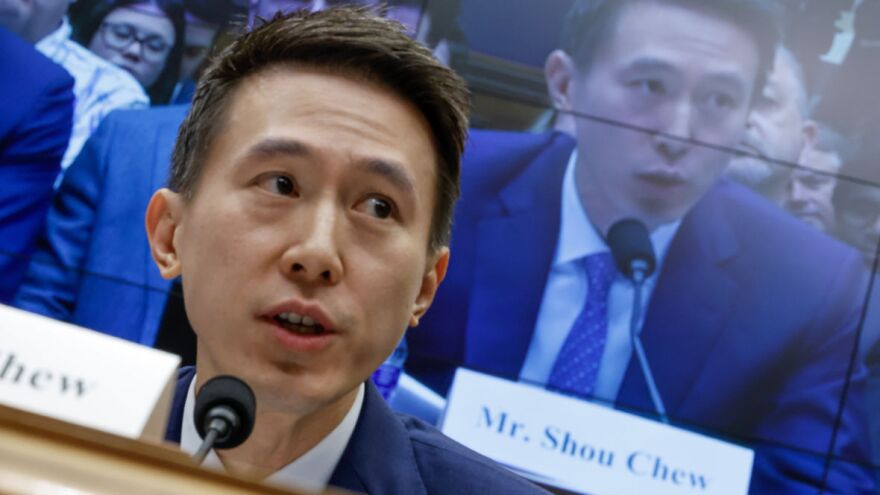Updated March 23, 2023 at 5:34 PM ET
TikTok Chief Executive Shou Zi Chew faced roughly five hours of questioning by dozens of lawmakers in a high-stakes hearing with t he House Energy and Commerce Committeeon Thursday about the safety and security of the immensely popular app.
Republicans and Democrats alike grilled the 40-year-old Chew about China's relationship with his company, data privacy, possible teen addiction to the app, misinformation and fentanyl.
Front and center were concerns that TikTok's parent company Bytedance might be sharing data from U.S. users with the Chinese government.
"To the American people watching today, hear this: TikTok is a weapon by the Chinese Communist Party to spy on you and manipulate what you see and exploit for future generations," said Committee Chair Cathy McMorris Rodgers, R-Wash.
Rodgers asked Chew to say "with 100% certainty" that neither Chinese authorities nor employees of TikTok parent company ByteDance can use the app to spy on Americans, or promote content favorable to Chinese interests.
Chew said TikTok does not promote or remove content at the request of Chinese authorities. He said the app is "free from any manipulation from any government."
Rodgers shot back: "If you can't say it 100% certain, I take that as a no."
Chew's appearance comes soon after White House officials told TikTok that it must divest from ByteDance, or face a severe punishment, including the possibility of a ban. A growing chorus of bipartisan lawmakers view TikTok as a threat. They fear China's authoritarian regime could use the app to spy on, or blackmail, the millions of Americans who use it every day.
After the hostile hearing, TikTok spokesperson Brooke Oberwetter said the day had been "dominated by political grandstanding" that didn't acknowledge TikTok's current attempts to address the issues raised by the lawmakers.
"Also not mentioned today by members of the committee: the livelihoods of the 5 million businesses on TikTok or the First Amendment implications of banning a platform loved by 150 million Americans," Oberwetter said in a statement.
While U.S. officials have not offered any evidence that Chinese authorities have accessed the information of Americans on the app, national security experts say it is a real possibility.
Likewise, the Chinese government has not been shown to have ever influenced the app's recommendation algorithm, though experts also say it is hypothetically possible.
TikTok did admit employees in China accessed the data of a handful of U.S. journalists who were reporting on company leaks — an incident now being investigated by Justice Department, according to Forbes.
Members of both parties asked about "spying" and "surveillance" and "Project Texas"
During the hearing, Chew was grilled about whether the app shares data with the Chinese government. Many lawmakers used words like "spying" and "surveillance" - characterizations Chew disagreed with.
When asked if TikTok employees can spy on or target people in the U.S., Chew didn't answer directly with a "yes" or "no."
He said he has "seen no evidence that the Chinese government has access to that data. They have never asked us, we have not provided it."
The Biden administration told TikTok earlier this month that if its Chinese owners didn't sell their stakes in the app to a U.S. company, it would face being banned. TikTok offered an alternative it's currently working on, called "Project Texas."
The project involves restructuring TikTok so that its U.S. user data is stored with software company Oracle in Austin, Texas. In this scenario, the Chinese government couldn't access the data and it would be overseen by Oracle. Essentially it would act as a firewall.
"Project Texas" would cost TikTok $1.5 billion and would involve hiring thousands of employees focused on data security.
Chew admitted on Thursday that until Project Texas is complete, Beijing-based employees of TikTok would still be able to access U.S. user data. But, under the restructuring, the digital firewall would prevent Chinese employees from having access to Americans' personal information.
"The bottom line is this: American data stored on American soil, by an American company, overseen by American personnel," Chew said in his opening statement.
But the lawmakers didn't seem convinced.
"I still believe that the Beijing communist government will still control and have the ability to influence what you do," said Frank Pallone, the top Democrat on the committee.
Lawmakers went on to reprimand the CEO over the safety of children, misinformation and targeted advertising. The politicians brought up the death of a 12-year-old who died after seeing a TikTok post about the "Blackout Challenge," which involves people holding their breath until they pass out.
They also said the app promotes misinformation like antivaccine advice and voter suppression campaigns. They called TikTok a "propaganda machine" and said Chew was being "evasive."
Chew countered that there are parental controls and other measures to keep the app from becoming addictive.
When it came to protecting user data, Chew said: "I don't think ownership is the issue here."
"American social companies don't have a good track record with data privacy and user security," he said, pointing to the Cambridge Analytica scandal where Facebook users' personal data was used for political advertising.
Lawmakers, though, did not seem swayed by Chew's answers.
Rep. Gary Palmer of Alabama suggested that as long as TikTok is tethered to ByteDance, measures to shore up data security cannot be trusted.
"You have repeatedly used the word transparency throughout this hearing," Palmer said. "And every time you've said it, all I heard was deception."
NPR's Bobby Allyn contributed to this report
Copyright 2023 NPR. To see more, visit https://www.npr.org.



